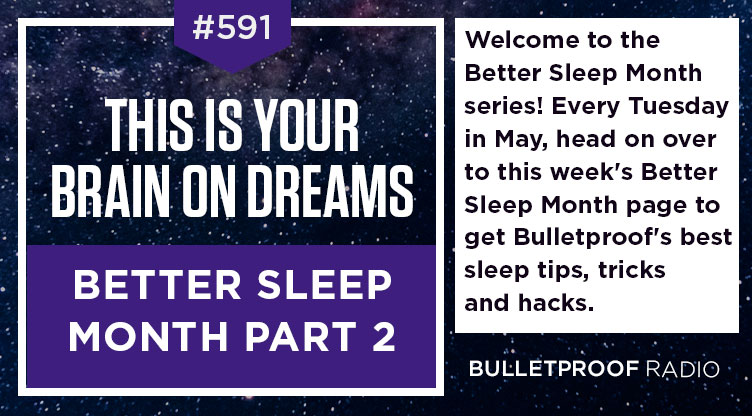Hack Your Dreams for Learning, Problem Solving, and More

- You might think of dreaming as a time when your mind wanders aimlessly, playing out all kinds of crazy scenarios.
- Dreams aren’t just random hallucinations. They’re an integral part of the way your brain works.
- Keep reading to find out how your dreams can benefit you, and how to get good at dreaming more, remembering what you dream, and interpreting your dreams.
You might think of dreaming as a time when your mind wanders aimlessly, playing out all kinds of crazy scenarios. Are dreams just random hallucinations, or are they an integral part of your brain’s inner workings?
Harvard psychologist Deirdre Barrett, Ph.D. has focused her career on the science of dreaming, and shares hacks and techniques to increase the dreams you have as well as the dreams you remember. But why would you want to be more aware of your brain’s erratic storytelling while you’re snoozing away?
Barrett shares a typical narrative she hears often. “I was working on this chemistry problem that I just couldn’t solve, and then one night I had this dream where dream solved it,” people tell her. Some dreams are breakthrough dreams — solutions, ideas, and inspiration that come while you sleep. On an episode of the Bulletproof Radio podcast (iTunes), she explains how you can dream more often, remember your dreams, then put them to work for you.

How to put your dreams to work for you
1. Before bed, be intentional about dreaming
 Barrett finds it impactful to tell yourself before nodding off, “I’m going to remember my dreams tonight.” It puts you into the frame of mind that you’re going to dream, and she has observed that it makes your recall of the dream last just a tad longer.
Barrett finds it impactful to tell yourself before nodding off, “I’m going to remember my dreams tonight.” It puts you into the frame of mind that you’re going to dream, and she has observed that it makes your recall of the dream last just a tad longer.
2. Give your brain the opportunity to dream (read: sleep)

You have to sleep to dream, and getting adequate sleep is the best way to ensure your brain will spend enough time in the dream state. “Sleeping seven or eight hours a night is very important because we dream about every 90 minutes. Each dream period gets much longer than the preceding one, so if you sleep four hours instead of eight, you’re not getting half your dream time,” says Barrett.
Related: Bulletproof 30-Day Sleep Challenge
3. Take a moment to remember your dreams when you wake up

Think about it — you dream every 90 minutes when you sleep. How much of that do you remember? Most people remember very few dreams. Some people claim to never dream at all, even though they do — the rapid eye movement (REM) sleep stage produces dreams, whether you remember them or not.
You immediately forget the overwhelming majority of your dreams, and the critical period to remember your dreams lasts just a minute or two after you wake. As soon as you start thinking about something else, the dream is gone.
Take a minute or two every morning to think about whether or not you had a dream. The best thing to do is to keep a voice recording device (you can use your smartphone’s recording app) or a pen and paper beside your bed. That way, you can record as much as you remember immediately upon waking, even when you wake up briefly in the middle of the night.
4. Interpret your dreams
 There are thousands of dream books out there that tell you if you dream of chickens, it means X, and if you dream of falling, it means Y.
There are thousands of dream books out there that tell you if you dream of chickens, it means X, and if you dream of falling, it means Y.
Barrett explains that rigid interpretations like that discount the personal experience that you brought to the dream. For example, if you dreamt of flying, it can either mean that you feel out of control, or that you feel free, depending on what flying means to you.
Barrett uses the example of a dog. Dogs can be lots of things — cute, threatening, vulnerable — it all depends on your prior experience with dogs.
Barrett advises making notes on each of the main characters, events, and surroundings, and what each element means to you. Then, you string it together into something meaningful. Sometimes, the meaning is obvious. Other times, it will make no sense at all. When it does tell a story, dreams are extremely valuable — that’s when learning, ideas, inspiration, problem-solving, and so much more happens.
5. Next-level dreaming
 Once you’re good at dreaming and recall, you can put your dreams to work for you.
Once you’re good at dreaming and recall, you can put your dreams to work for you.
Before bed, you can tell yourself what you want to dream about. Visualize what problem you want to solve, or what kinds of ideas you would like to come to you. Barrett shares an example of a group of college students who were trying to solve homework problems and had not yet arrived at the solution. “Fifty percent of them dreamed about the topic of their problem in a week of doing this, and about one fourth solved the problem,” she explains.
Some people dream every night and remember a lot of it in detail. For the rest of us, dreaming is a learned skill, and it may take time. All in all, though, it takes very little effort — just a moment before bed to state your intention, and a moment to wake up to jot down what you remember can greatly increase your mental output. And while you’re honing your dreaming and interpretation skills, you’ll get some entertainment value out of the exercise. Your unbridled brain can be one creative and amusing machine.
Sign up for early access to sales, product launches, the latest Bulletproof news and more!



